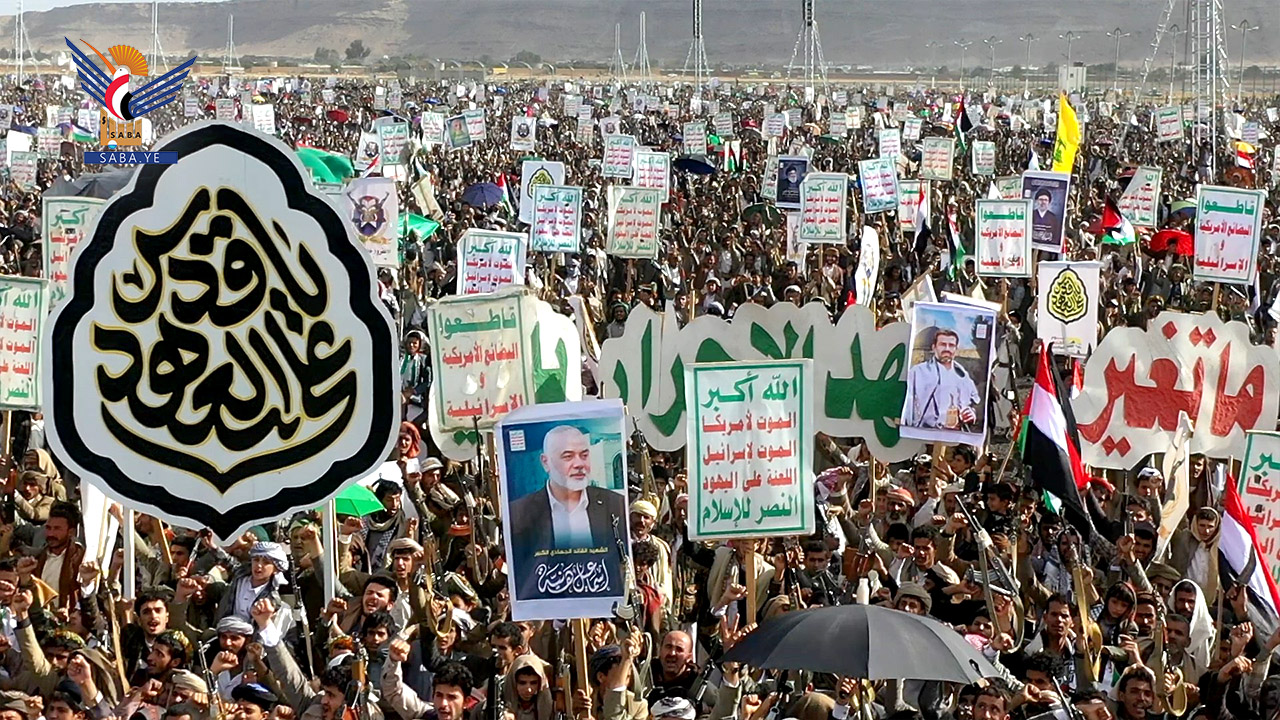Sana’a – SABA: Jamil Al-Qashm
At a time when determination has faded in many Arab and Islamic nations, Yemenis took to the streets in massive, million-strong marches on International Quds Day, as if the very land itself was chanting for Palestine, and as if every inch of Yemen had become a voice condemning the inaction of governments and reaffirming that Palestine lives in the hearts of Yemenis.
These marches were yet another declaration that Yemen, despite its long-standing siege, remains the faithful guardian of Jerusalem. While some Arab states rushed to normalize ties with the Israeli occupation, Yemenis provided a real lesson in loyalty to Palestine. These vast crowds served as a direct and practical response to all the attempts to suffocate the Palestinian cause through the policies of certain Arab regimes.
Unsurprisingly, Yemen is the Arab nation most fervently commemorating International Quds Day. This country, which endures a suffocating blockade and continuous aggression, has never wavered in its stance, nor has it weakened in its belief that the liberation of Palestine is an integral part of its larger struggle against domination and tyranny.
In every street and square, chants filled the air, and Palestinian flags waved alongside Yemeni ones, creating a scene that bridged the distance between Yemen and Jerusalem. This reaffirmed that geography has never been a barrier to conviction and that just causes will always find supporters, no matter how far they may be.
These marches were a reaffirmation of a clear equation in an era of betrayals: there are still those who stand firm, and there are still those for whom Jerusalem is not just a slogan, but a creed, a principle, and a destiny.
The presence of the Yemeni people on this day was not merely a response to an annual call; it was an expression of a deeply rooted position—one that sees Palestine as a test for the entire nation. They understand that those who abandon Jerusalem today will forsake their dignity tomorrow and will ultimately surrender their decisions entirely to their enemies.
What sets Yemen apart is that this stance is not mere rhetoric for media consumption but an essential part of its national identity. For Yemenis, Palestine is a personal cause, as if every home in Sana’a, Saada, Hodeidah, and beyond is a home in Jerusalem.
Yemen’s Quds Day marches resembled an open trial of history, exposing traitors and reaffirming that, despite its wounds, Yemen remains the last stronghold of steadfast, unbending principles that cannot be bought or sold.
Many free people across the Arab and international world view Yemen’s growing support for Palestine with admiration. They see these marches as a sacred duty and an extension of Yemen’s struggle, which is not merely against aggression but against all projects of submission and subjugation that seek to turn the region into a weak appendage of the West and the Zionists.
In moments like these, Yemenis recognize that their battle against those who attack their land is inseparable from their battle against those who occupy Al-Quds, because the enemy is one, and the project is one.
Looking at these marches, one realizes the fundamental difference between nations that have lost their sense of identity and those that still possess the ability to feel anger, to reject, and to cry out in the face of tyrants.
Yemen remains a steadfast defender of the nation’s just causes, foremost among them the Palestinian cause. While many Arab countries have turned their backs on Al-Aqsa and distanced themselves from their national and Islamic principles, Yemen has insisted on standing at the forefront, sending a clear message to the world: Palestine is the compass that cannot be abandoned.
According to analysts, Yemen’s growing million-strong demonstrations reflect the deeply ingrained identity of an authentic people who uphold their firm principles. This has made Yemen one of the key pillars of resistance in the Arab and Islamic world. The massive marches on International Quds Day demonstrated that Yemen not only supports the Palestinian cause but actively works to keep it alive in every corner of its land.
Conversely, analysts argue that the silence shrouding many Arab capitals is the result of a deliberate project—one that aims to relegate Palestine to the past, reduce Jerusalem to a marginal memory, and normalize occupation as an accepted part of the region’s political landscape.
Yet Yemen, which has shattered all imposed equations, refuses to be part of this cheap spectacle. Here, causes are not for sale, and stances are not up for purchase. Here, Palestine is not a bargaining chip to be traded for positions or humiliating agreements.
The greatness of Yemen’s unwavering solidarity is reflected in the repeated affirmations of the leader of the revolution, Sayyed Abdul-Malik Badr Al-Din Al-Houthi, who has stated on multiple occasions that "Palestine will remain in the heart of every Yemeni, and Yemen will continue to be the voice that defends Al-Aqsa, never abandoning its stance, no matter the challenges." These words serve as a declaration that Palestine is not a temporary political choice in Yemen but a religious and national cause that transcends political borders.
Today, Yemen does not just raise the Palestinian flag—it raises the banner of a fallen nation, reminding the world that Jerusalem remains the cause that topples thrones, unmasks traitors, and rewrites history—not with the pens of politicians, but with the voices of peoples that refuse to die.
E.M

| more of (Local) |



